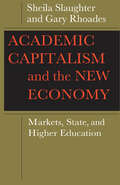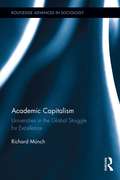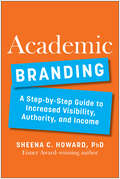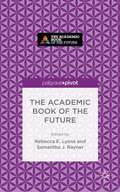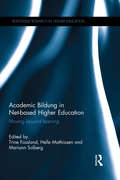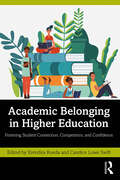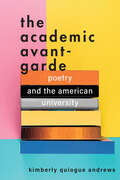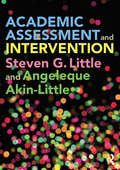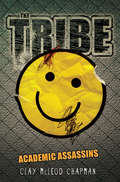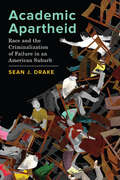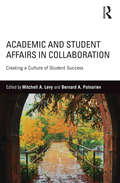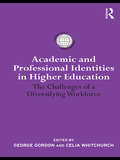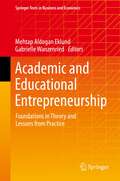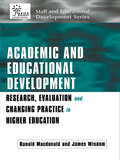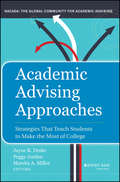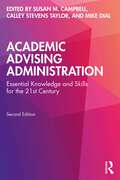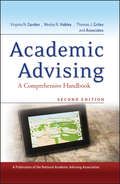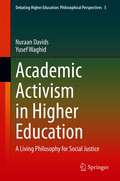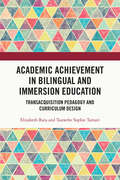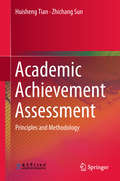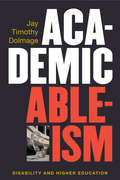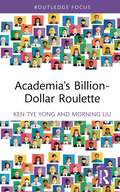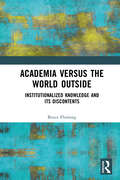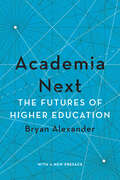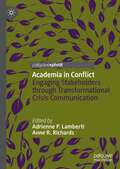- Table View
- List View
Academic Capitalism and the New Economy: Markets, State, and Higher Education
by Sheila Slaughter Gary RhoadesAs colleges and universities become more entrepreneurial in a post-industrial economy, they focus on knowledge less as a public good than as a commodity to be capitalized on in profit-oriented activities. In Academic Capitalism and the New Economy, higher education scholars Sheila Slaughter and Gary Rhoades detail the aggressive engagement of U.S. higher education institutions in the knowledge-based economy and analyze the efforts of colleges and universities to develop, market, and sell research products, educational services, and consumer goods in the private marketplace. Slaughter and Rhoades track changes in policy and practice, revealing new social networks and circuits of knowledge creation and dissemination, as well as new organizational structures and expanded managerial capacity to link higher education institutions and markets. They depict an ascendant academic capitalist knowledge/learning regime expressed in faculty work, departmental activity, and administrative behavior. Clarifying the regime's internal contradictions, they note the public subsidies embedded in new revenue streams and the shift in emphasis from serving student customers to leveraging resources from them.Defining the terms of academic capitalism in the new economy, this groundbreaking study offers essential insights into the trajectory of American higher education.
Academic Capitalism: Universities in the Global Struggle for Excellence (Routledge Advances in Sociology)
by Richard MünchThis book investigates the intensifying struggle for excellence between universities in a globalized academic field. The rise of the entrepreneurial university and academic capitalism are superimposing themselves on the competition of scientists for progress of knowledge and recognition by the scientific community. The result is a sharpening institutional stratification of the field. This stratification is produced and continuously reproduced by the intensified struggle for funds with the shrinking of block grants and the growing significance of competitive funding, as well as the increasing impact of international and national rankings on academic research and teaching. The increased allocation of funds on the basis of performance leads to overinvestment of resources at the small top and underinvestment for the broad mass of universities in the middle and lower ranks. There is a curvilinear inverted u-shaped relationship of investments and returns in terms of knowledge production. Paradoxically, the intrusion of the economic logic and measures of managerial controlling into the academic field imply increasing inefficiency in the allocation of resources to universities. The top institutions suffer from overinvestment, the rank-and-file institutions from underinvestment. The economic inefficiency is accompanied by a shrinking potential for renewal and open knowledge evolution.
Academic Branding: A Step-by-Step Guide to Increased Visibility, Authority, and Income
by Sheena HowardBecome a thought leader in your postgraduate field—and make money while doing so, with this step-by-step guide from an academic who has been there.Academic Branding gives academics and scholars the tools and strategies they need to position themselves outside of academia so they can reach the masses and make an impact—without the expense of a publicist. With the practices in this book, readers will build a powerful brand, become a public intellectual, and grow their audience with guidance from Sheena C. Howard, PhD. She&’s been where you are now, and she&’s ready to help you grow beyond what you imagine. With Dr. Howard&’s unique and thorough approach to success in the age of social media, you&’ll learn how to:Reframe the way you think about self-promotionIdentify your brand archetype and create a brand statementReach an audience beyond academia Build multiple revenue streamsGet your ideas (and content) to spreadCreate a movement around your expertise Land major media spots and speaking engagements In a world where anyone who is savvy online can turn themselves into a subject matter expert, it&’s important that we lift up and amplify the voices of actual subject matter experts. This guide will teach you how to reach the audience that needs your expertise most, building a brand and achieving financial freedom along the way.
The Academic Book of the Future
by Samantha J. Rayner Rebecca E. LyonsThis book is open access under a CC-BY licence. Part of the AHRC/British Library Academic Book of the Future Project, this book interrogates current and emerging contexts of academic books from the perspectives of thirteen expert voices from the connected communities of publishing, academia, libraries, and bookselling.
Academic Bildung in Net-based Higher Education: Moving beyond learning (Routledge Research in Higher Education)
by Trine Fossland Helle Mathiasen Mariann SolbergThe explosive emergence of net-based learning in higher education brings with it new possibilities and constraints in teaching and learning environments.This edited collection considers how the concept of Academic Bildung - a term suggesting a personal educational process beyond actual educational learning - can be applied to net-based higher education. The book is drawing on Scandinavian research to address the topic from both a theoretical and practical standpoint.Chapters explore the facilitation of online courses and argue how and why universities should involve dimensions of Academic Bildung on both a strategic and technological pedagogical content level. The book is structured in three parts: Part I frames the current state of net-based learning and introduces Bildung as a concept; Part II contains a set of four case studies in Norway, Sweden and Denmark, also including a fifth study that looks at Scandinavian approaches to teaching and learning in comparison with data from the USA, the UK, Australia and Canada; Part III provides a synthesis of theories and cases to examine whether a Scandinavian orientation can be discerned. Contributions suggest that in order to address one of the fundamental functions of higher education, the ability to produce new knowledge, the Academic Bildung of the students has to be in focus. Grounded in theoretical and empirical discussion, this book will appeal to researchers and academics in the field of higher education as well as personnel who work with teaching and learning with technology, and academics interested in the question of Academic Bildung.
Academic Belonging in Higher Education: Fostering Student Connection, Competence, and Confidence
by Eréndira Rueda Candice Lowe SwiftThe concept of belonging has been increasingly understood as the missing piece in diversity, equity, and inclusion efforts in higher education. This book explores the need to recognize and account for institutional-level factors that shape academic belonging, thereby improving student experience and outcomes. Though recent scholarship has identified several factors that are associated with student belonging in academics, there is little research that addresses what faculty can do in concrete terms to promote belonging, particularly in the domains where they have the most influence. The 12 chapters in this volume introduce readers to an array of collaborative, cutting-edge efforts to develop pedagogies, programs, strategies, and environments that help students develop academic belonging; that is, a sense of connection, competence, and confidence in academic domains. This book is written for higher education faculty, administrators, and researchers who wish to enhance their students’ sense of academic belonging by taking informed, practical measures to make them feel valued and supported.
The Academic Avant-Garde: Poetry and the American University
by Kimberly Quiogue AndrewsThe surprising story of the relationship between experimental poetry and literary studies.In The Academic Avant-Garde, Kimberly Quiogue Andrews makes a provocative case for the radical poetic possibilities of the work of literary scholarship and lays out a foundational theory of literary production in the context of the university. In her examination of the cross-pollination between the analytic humanities and the craft of poetry writing, Andrews tells a bold story about some of today's most innovative literary works. This pathbreaking intervention into contemporary American literature and higher education demonstrates that experimental poetry not only reflects nuanced concern about creative writing as a discipline but also uses the critical techniques of scholarship as a cornerstone of poetic practice. Structured around the concepts of academic labor (such as teaching) and methodological work (such as theorizing), the book traces these practices in the works of authors ranging from Claudia Rankine to John Ashbery, providing fresh readings of some of our era's most celebrated and difficult poets.
Academic Assessment and Intervention
by Steven G. Little Angeleque Akin-LittleServing students with academic deficiencies necessitates communication and collaboration among professionals from several disciplines. Academic Assessment and Intervention brings together divergent approaches in order to demonstrate that scientific evidence, rather than biases or previous practice, must determine assessment practices that are selected and used for particular purposes. Similar to a handbook in its comprehensive topical coverage, this edited collection provides a contextual foundation for academic assessment and intervention; describes both norm-referenced and curriculum-based assessment/measurement in detail; considers the implications of both of these assessments on ethnically diverse populations; provides a clear link between assessment, evidence-based interventions and the RTI model; and considers other important topics related to this area such as teacher behavior. Intended primarily for graduate-level courses in education, school psychology, or child clinical psychology, it will also be of interest to practicing professionals in these fields.
Academic Assassins (A Tribe Novel #3)
by Clay McLeod ChapmanOnce the Tribe laid siege to Camp New Leaf, Spencer was left with no choice but to call in the reinforcements: their parents. But when he sees that his own mom and dad have left him high and dry, Spencer runs into the woods and never looks back. After months of hiding away, he is found and sentenced to spend time at the Kesey Reclamation Center, where kids are placed under strict surveillance. He knows he has to escape, but where can he go? If Spencer isn???t careful he might be punished and sent to the ???Black Hole,??? and it only takes one visit to change you???for better, or worse.
Academic Apartheid: Race and the Criminalization of Failure in an American Suburb
by Sean J. DrakeIn Academic Apartheid, sociologist Sean J. Drake addresses long-standing problems of educational inequality from a nuanced perspective, looking at how race and class intersect to affect modern school segregation. Drawing on more than two years of ethnographic observation and dozens of interviews at two distinct high schools in a racially diverse Southern California suburb, Drake unveils hidden institutional mechanisms that lead to the overt segregation and symbolic criminalization of Black, Latinx, and lower-income students who struggle academically. His work illuminates how institutional definitions of success contribute to school segregation, how institutional actors leverage those definitions to justify inequality, and the ways in which local immigrant groups use their ethnic resources to succeed. Academic Apartheid represents a new way forward for scholars whose work sits at the intersection of education, race and ethnicity, class, and immigration.
Academic and Student Affairs in Collaboration: Creating a Culture of Student Success
by Mitchell A. Levy Bernard A. PolnarievAcademic and Student Affairs in Collaboration provides a comprehensive and evidenced-based understanding of the partnerships necessary to achieve an institutional culture devoted to student success. Chapter authors explore how to design, implement, and assess collaborative efforts between student and academic affairs in support of increased student success. This book provides best practices for fostering and enhancing campus dialogue, career development pathways, academic support services, and other important initiatives to increase retention and learning outcomes, improve motivation and goal attainment, and enhance institutional accountability. This book is a must-read for scholars, faculty, leaders, and practitioners in Student Affairs and Higher Education interested in achieving student success at their universities and colleges.
Academic and Professional Identities in Higher Education: The Challenges of a Diversifying Workforce (International Studies in Higher Education)
by Celia Whitchurch George GordonThe latest volume in the Routledge International Studies in Higher Education Series, Academic and Professional Identities in Higher Education: The Challenges of a Diversifying Workforce, reviews the implications of new forms of academic and professional identity, which have emerged largely as a result of a broadening disciplinary base and increasing permeability between higher education and external environments. The volume addresses the challenges faced by those responsible for the wellbeing of academic faculty and professional staff. International perspectives examine current practice against a background of rapidly changing policy contexts, focusing on the critical ‘people dimension’ of enhancing academic and professional activity, while also addressing national, socio-economic, and community agendas. Consideration is given to mainstream academic faculty and professional staff, researchers, library and information professionals, people with an interest in teaching and learning, and those involved in individual projects or institutional development. The following provide the key themes of Academic and Professional Identities in Higher Education: The Challenges of a Diversifying Workforce: The implications of diversifying academic and professional identities for the functioning of higher education institutions and sectors. The pace and nature of such change in different institutional systems and environments. The challenges to institutional systems and structures from emergent identities and possible tensions, and how these might be addressed. The implications of blurring academic and professional identities, with a shift towards mixed or ‘blended’ roles, for individual careers and institutional development.
Academic and Educational Entrepreneurship: Foundations in Theory and Lessons from Practice (Springer Texts in Business and Economics)
by Mehtap Aldogan Eklund Gabrielle WanzenriedThe editors and authors of this textbook introduce the relatively new subject of “academic and educational entrepreneurship” from a holistic viewpoint. Following a structured approach suitable for the classroom, the book opens with a concise introduction to the theories and schools of thoughts in the context of academic and educational entrepreneurship. It then reveals seven scientifically developed key aspects (including sustainability, internationalization, and cultural components) in order to be a successful academic and educational entrepreneur. After the theoretical background, the authors, who are the doyens of academic and educational entrepreneurship, share their insights and professional experiences with the readers by demonstrating the impact and relevance of the theoretical concepts to the actual entrepreneurial experience.
Academic and Educational Development: Research, Evaluation and Changing Practice in Higher Education (SEDA Series)
by Ranald Macdonald James WisdomPart of the well-known Staff and Educational Development Series, this practice oriented book brings together leading research and evaluation approaches and supporting case studies from leading educational researchers and innovative teachers.With much emphasis on change, innovation and developing best practice in higher education, it is essential that those involved in actually developing, researching or implementing approaches to teaching, learning or management, are informed by the experiences of others. The emphasis of this book is on changing practice in HE; how developments come about; what research underpins desirable development; and the impact of development of student learning, staff expertise and institutional practice and policy. Specifically, the book is developed in two themed parts: Part A, Supporting change within subjects and departments. Part B, Supporting change within institutions and the wider environment.
Academic Advising Approaches
by Peggy Jordan Jayne K. Drake Marsha A. MillerStrong academic advising has been found to be a key contributor to student persistence (Center for Public Education, 2012), and many are expected to play an advising role, including academic, career, and faculty advisors; counselors; tutors; and student affairs staff. Yet there is little training on how to do so. Various advising strategies exist, each of which has its own proponents. To serve increasingly complex higher education institutions around the world and their diverse student cohorts, academic advisors must understand multiple advising approaches and adroitly adapt them to their own student populations. Academic Advising Approaches outlines a wide variety of proven advising practices and strategies that help students master the necessary skills to achieve their academic and career goals. This book embeds theoretical bases within practical explanations and examples advisors can use in answering fundamental questions such as:What will make me a more effective advisor?What can I do to enhance student success?What conversations do I need to initiate with my colleagues to improve my unit, campus, and profession?Linking theory with practice, Academic Advising Approaches provides an accessible reference useful to all who serve in an advising role. Based upon accepted theories within the social sciences and humanities, the approaches covered include those incorporating developmental, learning-centered, appreciative, proactive, strengths-based, Socratic, and hermeneutic advising as well as those featuring advising as teaching, motivational interviewing, self-authorship, and advising as coaching. All advocate relationship-building as a means to encourage students to take charge of their own academic, personal, and professional progress.This book serves as the practice-based companion to Academic Advising: A Comprehensive Handbook, also from NACADA. Whereas the handbook addresses the concepts advisors and advising administrators need to know in order to build a success advising program, Academic Advising Approaches explains the delivery strategies successful advisors can use to help students make the most of their college experience.
Academic Advising Administration: Essential Knowledge and Skills for the 21st Century
by Susan M. CampbellThe second edition of Academic Advising Administration: Essential Knowledge and Skills for the 21st Century examines the evolving boundary-crossing role of the advising administrator in an increasingly complex and diversified higher education environment. Written by scholar-practitioners in the field, chapters situate advising administration as a central and critical function that connects the curriculum and scholarship work of faculty members with the aspirations and goals of students. Through scholarly and practical content, combined with reflective questions, chapters challenge readers to examine the work of advising administration through the lenses of social justice, globalization, and the nature of the academy itself. The portrait of the advising administrator being developed in this second edition is that of a skilled practitioner; visionary and transformative leader; intellectual partner and collaborator; and academic advising "scholar-in-chief." Intended equally for aspiring, new, and seasoned advising administrators, this book presents theories, scholarship, and practical applications that offer opportunities for personal and professional growth, self-reflection, and inspiration.
Academic Advising
by Gordon Virginia N. Habley Wesley R. Grites Thomas J.One of the challenges in higher education is helping students to achieve academic success while ensuring their personal and vocational needs are fulfilled. In this updated edition more than thirty experts offer their knowledge in what has become the most comprehensive, classic reference on academic advising. They explore the critical aspects of academic advising and provide insights for full-time advisors, counselors, and those who oversee student advising or have daily contact with advisors and students. New chapters on advising administration and collaboration with other campus services A new section on perspectives on advising including those of CEOs, CAOs (chief academic officers), and CSAOs (chief student affairs officers) More emphasis on two-year colleges and the importance of research to the future of academic advising New case studies demonstrate how advising practices have been put to use.
Academic Activism in Higher Education: A Living Philosophy for Social Justice (Debating Higher Education: Philosophical Perspectives #5)
by Nuraan Davids Yusef WaghidThis book argues for renewed understandings of academic activism, understandings that conceive of the ideas, arguments and scholarship of the academe as embedded within the practices of what the academy does. It examines why and how a renewed notion of academic activism informs a philosophy of higher education specifically in relation to teaching and learning. The book focuses on the theories and practices of teaching and learning, in particular how such pedagogical actions are guided by social, political and cultural influences outside of the university as a higher education institution. The authors advocate for a living philosophy of higher education that is commensurate with real actions and imaginary fictions of what constitutes higher education and what remains in becoming for the discourse. With a focus on South African social justice education, the book imagines pathways for academic activism to manifest in revolutionised pedagogical actions or actions that bring into contestation what already exists with the possibility for the cultivation of renewal.
Academic Achievement in Bilingual and Immersion Education: TransAcquisition Pedagogy and Curriculum Design
by Elizabeth Rata Tauwehe Sophie TamatiThis book is about two innovative methods for teachers of bilingual students to use in improving their academic achievement. Transacquisition Pedagogy or TAP developed by Tauwehe Sophie Tamati is the method described in the book’s first part. It uses principles of flexible bilingualism and a task sequenced approach. The success of TAP in an intervention study in two of New Zealand’s Māori schools illustrates how cognitive and linguistic processes can be used to increase student conceptual understanding and to improve their academic biliteracy. Part two is about the Curriculum Design Coherence Model (CDC Model) created by Elizabeth Rata. It shows teachers how to design concepts, content and competencies to connect academic knowledge and thinking processes. The CDC Model has proved its success in the Knowledge-Rich School Project in New Zealand and England. TransAcquistion Pedagogy and the CDC Model are aligned. TAP works by putting the CDC design method into practice. The separate usefulness of TAP and the CDC Model and the added value of their alignment provides an innovative approach to education. Used together or separately they provide invaluable teaching methods for bilingual, immersion and mainstream education.
Academic Achievement Assessment: Principles and Methodology
by Huisheng Tian Zhichang SunThis book consists of introduction to academic achievement assessment, international comparison of academic achievement assessment and reference, as well as theoretical system and practice strategy of academic achievement assessment. The study indicates that the development trends of foreign academic achievement assessment are: establishing a complete education quality monitoring system; paying more attention to the function and value of independent education quality monitoring institution and intermediary organization; the orientation based on the integrated development of students growing more apparent; marching from “evaluation of study” to “evaluation for study”; and placing educational equity in a prominent position. This book is easy to understand and readable for professionals like teachers, educational researchers and particularly those engaged in academic achievement.
Academic Ableism: Disability and Higher Education (Corporealities: Discourses Of Disability)
by Jay T Dolmage<P>Academic Ableism brings together disability studies and institutional critique to recognize the ways that disability is composed in and by higher education, and rewrites the spaces, times, and economies of disability in higher education to place disability front and center. <P>For too long, argues Jay Timothy Dolmage, disability has been constructed as the antithesis of higher education, often positioned as a distraction, a drain, a problem to be solved. The ethic of higher education encourages students and teachers alike to accentuate ability, valorize perfection, and stigmatize anything that hints at intellectual, mental, or physical weakness, even as we gesture toward the value of diversity and innovation. <P> Examining everything from campus accommodation processes, to architecture, to popular films about college life, Dolmage argues that disability is central to higher education, and that building more inclusive schools allows better education for all.
Academia's Billion-Dollar Roulette
by Ken-Tye Yong Morning LiuThis book explores how in a rapidly shifting world, higher education has found itself at the crux of socio-economic, demographic, and technological transformations. This book dives deep into this evolving landscape, navigating the vast complexities of global higher education and its cultural implications.From demographic challenges and economic pressures to the game-changing implications of Artificial Intelligence, this book paints a holistic picture, highlighting the intersections and potential futures of academia. Equipped with meticulous research, global case studies, and enlightening expert opinions, this book offers a rich tapestry of insights that cater to a diverse array of readers. As universities grapple with uncertainties, this book emerges as a compass, offering actionable insights, strategies, and foresight into the transformative potential of various factors. It’s not just a diagnosis of the current state but also a prescription for the road ahead. This book distinguishes itself as a unique and essential discourse in the realm of educational literature, presenting a rich, multidimensional analysis of the crossroads at which higher education currently stands. This book is not just an academic treatise; it is a clarion call to action, urging universities, policymakers, educators, and students to engage deeply with the transformative challenges and opportunities presented by the digital age.This book is tailored for a broad spectrum of readers including Higher education policymakers, university administrators, and educators will find it particularly invaluable. Yet, its accessible language and engaging narratives also appeal to students, and anyone curious about the trajectory of higher education in our rapidly changing world.
Academia versus the World Outside: Institutionalized Knowledge and Its Discontents
by Bruce FlemingAcademia versus the World Outside lays out the givens of the knowledge industry located within the ivory tower, colleges and universities. It then moves outside academia to consider this restricted world the way most people see it. The contrast between these two views of academia explains and is at the basis of the left–right animosity of our day.The knowledge industry, a creation of the post-Enlightenment modern age along with other industrial and post-industrial enterprises, is based on creating and adding to a store of knowledge as its own end. This makes academia alien to the more random and personal nature of knowledge acquisition in our everyday lives, as indeed every industry is alien to everyday life in the modern age. Yet most academics are so immersed in the peculiar project they have chosen as their life’s work that they are either unaware of or unsympathetic to the fact that people outside live very different lives with very different presuppositions. Most non-academics, for their part, find academia strange, and for very good reason. Academia versus the World Outside makes this contrast and conflict clear from both directions.This book is aimed primarily at academics, most of whom so take for granted the givens of what they do that they fail to understand why the vast majority of people outside find academia alien. This has led to an increasingly hostile and utterly predictable left–right political conflict, academia tending increasingly left and the world outside increasingly right. The goal of this book is to reduce the tension between both sides: if read by non-academics, this book may help these understand the givens of a world as strange to everyday life as any other specialized industry in the modern age.
Academia Next: The Futures of Higher Education
by Bryan AlexanderFrom the renowned futurist, a look at how current trends will transform American higher education over the next twenty years.2020 Most Significant Futures Work Award Winner, Association of Professional FuturistsThe outlook for the future of colleges and universities is uncertain. Financial stresses, changing student populations, and rapidly developing technologies all pose significant challenges to the nation's colleges and universities. In Academia Next, futurist and higher education expert Bryan Alexander addresses these evolving trends to better understand higher education's next generation. Alexander first examines current economic, demographic, political, international, and policy developments as they relate to higher education. He also explores internal transformations within postsecondary institutions, including those related to enrollment, access, academic labor, alternative certification, sexual assault, and the changing library, paying particularly close attention to technological changes. Alexander then looks beyond these trends to offer a series of distinct scenarios and practical responses for institutions to consider when combating shrinking enrollments, reduced public support, and the proliferation of technological options.Arguing that the forces he highlights are not speculative but are already in play, Alexander draws on a rich, extensive, and socially engaged body of research to best determine their likeliest outcomes. It is only by taking these trends seriously, he writes, that colleges and universities can improve their chances of survival and growth. An unusually multifaceted approach to American higher education that views institutions as complex organisms, Academia Next offers a fresh perspective on the emerging colleges and universities of today and tomorrow.
Academia in Conflict: Engaging Stakeholders through Transformational Crisis Communication
by Adrienne P. Lamberti Anne R. RichardsThis book explores communication as a key influence on the trajectory of conflicts and crises in the specific context of academia. From the ideological responsibilities of academia to the profit-seeking motives of institutions, the authors explore challenges facing faculty across multiple disciplines. Critique of the higher education industry is more necessary than ever in the context of academic corporatization and marketization. Academia in Conflict reveals how institutional discourses can contribute to or mitigate conflict and crisis, offering communication practices that prioritize stakeholder experiences and needs. Enduring academic crises are addressed, including declines in public funding, mental health emergencies, and threats to job stability. Academia in Conflict provides crucial insights for navigating the challenges of higher education today.
